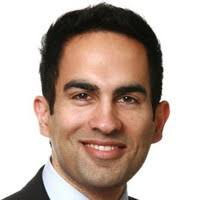
Nawaz Hussainaly
Nawaz Hussainaly is on the forefront of a major shift in the Canadian healthcare system. As a clinical trial lawyer for Alberta Health Services (AHS) — which serves as the largest healthcare services conglomerate in the country — he has witnessed a substantial growth in the pharmaceutical testing industry as a result of enticing collaborations with universities in the province.
Hussainaly grew up in Edmonton, Alberta. His parents work in the textile distribution business, and immigrated to Canada from South Asia in search of new opportunities for their family.
It was not until his brother pursued law, however, that Hussainaly considered becoming a lawyer himself. In fact, he received a bachelor’s degree at the University of Alberta in electrical engineering.
“I was at a point after doing my undergraduate studies at the University of Alberta where I was debating where to go. I decided to follow my brother’s footsteps, because he seemed to have a rewarding and enjoyable career,” he says.
Hussainaly also believed that a legal education would complement his training as an engineer, as it would further develop his critical thinking and communication skills.
He enrolled in law school at Queen’s University in 2007. Hussainaly attributes much of his attention to detail and interest in the legal foundations of society to his time studying law. In addition, Hussainaly maintains that incorporating various technologies into his workflow was a valuable law school practice that he still uses today.
His decision to become a lawyer would lead to a prosperous and productive legal career. After working as a summer and articling student, with a focus on intellectual property law at Growling Lafleur Henderson LLP in Ottawa, Hussainaly joined Bennett Jones LLP as an associate lawyer in 2011. His goal, however, was to become in-house counsel for a health services or educational institution.
“I always saw myself as in-house counsel because it allows you to focus on an area that you are passionate about, and really work hard at it. I always wanted to join an in-house firm that worked in either healthcare or education.”
He joined AHS as legal counsel in 2014. The company employs 108,000 people and provides healthcare to nearly four million citizens in Alberta. To Hussainaly, his role was the best possible outcome, allowing him to assist in a joint venture between a leading healthcare service provider and one of Canada’s top research universities.
As a clinical trial lawyer working closely with the Northern Alberta Clinical Trials Research Centre (NACTRC), a joint venture between AHS and the University of Alberta, Hussainaly facilitates the legal aspects of pharmaceutical testing on humans. Through NACTRC, AHS has access to an expansive set of resources that allow the company to attract clinical trials to the province.
“It’s a volume game in my industry. A lot of these studies are competitive. They are international trials and if our site is not ready in time, there may be another international site that takes our place,” he says. “There’s a premium on speed and efficiency. We do our best to meet those needs and not leave any studies on the table.”
That premium is getting harder to reach, as there is a growing demand for national and international organizations to do research in Alberta. In the entirety of Alberta, there are only a handful of people who are practicing in-house counsel for clinical trials. Hussainaly is proud that during his time with AHS, turnaround times for clinical research NACTRC have improved significantly.
“Sometimes in a large organization, there is a tendency to wait until things get out of control, and then react. It’s very encouraging to see that Alberta Health Services is proactive in meeting this growing need.”
Increasing regulations in Canada present a new obstacle to Hussainaly, requiring stricter restrictions on disclosures for health information. Alberta’s Heath Information Act sets limits on the disclosure of a patient’s health information. Such limits require the diligence of Canadian in-house counsel to ensure that international bodies are compliant with new rules and regulations.
“Privacy laws are often a hot button issue, and standards are different between Canada and the United States,” Hussainaly says.
Still, international sponsors flock to Alberta for its expansive set of university resources and efficient medical practices. Any risk pertaining to increasing privacy regulations, according to Hussainaly, is mitigated and handled appropriately.
Most provinces in Canada have multiple boards that provide healthcare services to its residents. Alberta is the only province in Canada that has one universal body. Because Alberta has the fastest growing population in Canada, with a growth rate of 2.9 percent, it can sometimes be difficult for AHS to tailor its services to specific healthcare needs. Hussainaly asserts that while providing the same level of care to the entire province comes with certain challenges, it ultimately allows for a more consistent healthcare experience.
“If we do a good job, we know that treatment is getting out to patients that really need it,” he says.
Hussainaly attributes ACC with aiding in his understanding of world affairs. Getting a sense for how lawyers operate around the world allows him to expand his perspective and apply new skills to his practice.
“Just seeing what various lawyers are doing around the world allows me to gain a perspective on new legal strategies. ACC provides me with important productivity hacks that are very helpful in bringing new processes to my office,” he says.
In the next few years, Hussainaly hopes that AHS will continue to expand and become the premier facilitator of clinical trials around the world.
“I want people to know that it’s easy and efficient to do research here. I want Alberta to become one of the most attractive sites for both the sponsors that aid in clinical research and for the doctors that conduct it.”




